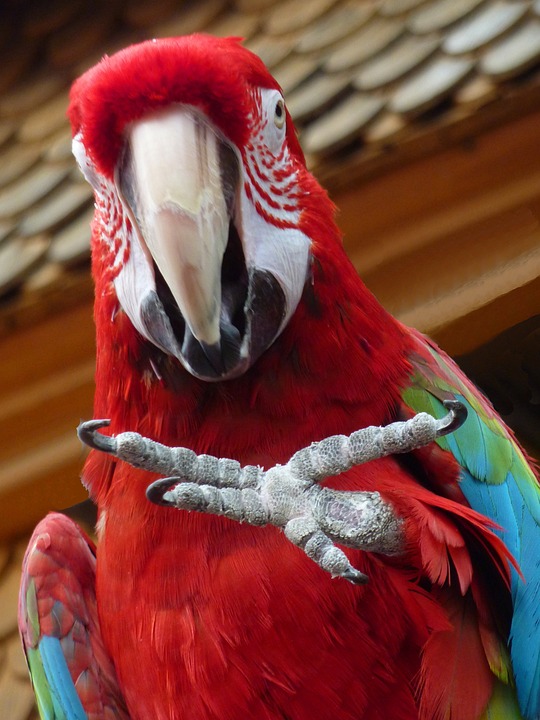Title: Discouraging Excessive Food Guarding Behaviors in Parrots: A Guide
Introduction:
Understanding and addressing food guarding behaviors in parrots is crucial for fostering a harmonious and healthy environment for both the bird and its human companions. In this article, we will explore effective strategies to discourage excessive food guarding behaviors in parrots, ensuring their well-being and promoting positive interactions. Additionally, we will address frequently asked questions regarding this issue.
I. Understanding Food Guarding Behaviors in Parrots
1.1 Definition and Causes:
Food guarding refers to the protective behavior exhibited by parrots when they feel threatened or possessive over their food resources. This behavior can be influenced by a variety of factors, including instinctual responses, past experiences, and environmental stressors.
1.2 Common Signs of Food Guarding:
Parrots may display various signs of food guarding, such as aggressive behavior, lunging, biting, territorial displays, or vocalizations. These signs serve as warnings to deter potential threats and protect their food.
1.3 Why Addressing Food Guarding is Important:
Excessive food guarding behaviors can lead to aggression and stress in parrots, negatively impacting their overall well-being and the quality of their interactions with humans and other parrots. It is essential to address these behaviors to establish a trusting and cooperative relationship with your parrot.
II. Strategies to Discourage Excessive Food Guarding Behaviors
2.1 Promoting a Positive Feeding Environment:
Creating a positive feeding environment is crucial in minimizing food guarding behaviors.
2.1.1 Establishing a Consistent Feeding Routine:
Establishing a consistent feeding routine helps parrots feel secure and reduces the need for excessive guarding. Stick to a regular schedule, providing meals at the same times each day.
2.1.2 Providing Sufficient and Varied Food Options:
Ensure that your parrot has access to a well-balanced diet with a variety of foods. This reduces the perception of scarcity and minimizes the need to guard food resources.
2.1.3 Encouraging Foraging and Mental Stimulation:
Implementing foraging activities and puzzle toys encourages natural behaviors and mental stimulation, diverting attention away from food guarding tendencies.
2.2 Gradual Desensitization and Counterconditioning:
Gradual desensitization and counterconditioning techniques can help modify food guarding behaviors by changing the parrot’s emotional response to perceived threats.
2.2.1 Introduction of “Exchange” Training:
Teaching your parrot the concept of exchanging items for rewards helps them understand that giving up their food does not result in loss but rather gains.
2.2.2 Utilizing Positive Reinforcement Techniques:
Rewarding desirable behaviors, such as calmly sharing food or allowing approach during mealtimes, reinforces positive associations and reduces food guarding tendencies.
2.2.3 Implementing Controlled Feeding Sessions:
Gradually introduce controlled feeding sessions where you can practice desensitization and counterconditioning techniques, gradually increasing the duration of calm and cooperative behavior.
2.3 Environmental Enrichment and Socialization:
Providing an enriched living space and opportunities for socialization can have a positive impact on reducing food guarding behaviors.
2.3.1 Creating an Enriched Living Space:
Offer a variety of toys, perches, and activities to keep your parrot mentally stimulated and engaged, reducing their focus on guarding behaviors.
2.3.2 Encouraging Interactive Playtime:
Engage in interactive play sessions with your parrot to build trust and strengthen the bond between you. This helps alleviate stress and can reduce food guarding tendencies.
2.3.3 Promoting Socialization with Humans and Other Parrots:
Encourage positive interactions with humans and, if possible, other parrots. This exposure to different individuals can help your parrot develop social skills and reduce territorial behavior.
III. Frequently Asked Questions (FAQs)
3.1 How long does it take to modify food guarding behaviors in parrots?
The time required to modify food guarding behaviors can vary depending on the individual parrot and the consistency of training. It may take weeks or even months to see significant improvements.
3.2 Can food guarding behaviors be completely eliminated?
While it may not be possible to completely eliminate food guarding behaviors, consistent training and environmental enrichment can significantly reduce their intensity and frequency.
3.3 Are certain parrot species more prone to food guarding behaviors?
Some parrot species may have a higher predisposition to food guarding behaviors due to their natural instincts or past experiences. However, with proper training and socialization, these behaviors can be effectively managed.
3.4 Is punishment an effective method to discourage food guarding?
Punishment is not recommended as it can escalate aggression and damage the trust between you and your parrot. Positive reinforcement techniques are more effective and promote a positive learning environment.
3.5 Should I consult a professional behaviorist for severe cases of food guarding?
If you encounter severe or persistent food guarding behaviors that are difficult to manage, it is advisable to seek the assistance of a professional behaviorist who specializes in parrot behavior. They can provide tailored guidance and support.
Conclusion:
By implementing the strategies outlined in this article, parrot owners can effectively discourage excessive food guarding behaviors in their feathered companions. Remember, patience, consistency, and positive reinforcement are key to modifying these behaviors. If you encounter challenges or have concerns, seeking guidance from a professional behaviorist is always a wise choice. With proper care and training, you can create a nurturing environment that promotes trust and allows your parrot to flourish.









